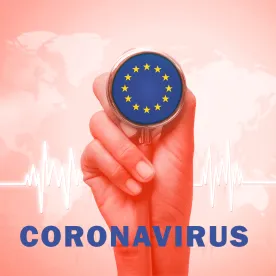In the fourth installment of McDermott’s HPE Europe Summer Webinar Series 2020: What’s the Impact of Recent Regulation and Government Measures on Investments in Healthcare and Life Sciences in Europe? moderator and McDermott partner Dr. Stephan Rau and industry experts Karthic Jayaraman of TPG Capital, Max Müller of Bayer, Ben Faircloth of L.E.K. Consulting and Dr. Ulrich Wandschneider, former CEO of Asklepios AG, currently at Trilantic Capital Partners and Supervisory Board member of BioNTech SE, the Nasdaq-listed developer of COVID vaccine, headquartered in Germany, discussed the impact that COVID-19 and the government measures to address it have had on investments in healthcare and life sciences in Europe.
“I think it’s about as interesting a time as any in my last 20 years investing,” said Jayaraman. “People are beginning to focus a lot more on innovation, the speed of innovation and how innovation is brought to market. I think the question is, “How can we continue to reward innovation, both by simplifying the process by which it’s made possible and how we value it?”
“New developments in digital health have become more and more attractive as people have had faster access to care and governments have understood that some of their regulations needed to be adjusted,” added Müller.
Jayaraman agreed. “There has been an acceleration of the provision of care through telehealth services and any kind of remote administration of care. It’s probably been an acceleration of two-plus years collapsed into months. I also think we’re going to see some vigorous conversations about supply chain disruption in the political arena, and also corporate boardrooms, as we think about where we want to place our supply chains moving forward. And currently there is great interest in R&D. If you have a COVID vaccine, everybody is running to invest in it. But we need to find a way to sustain that in other areas as well,” predicted Faircloth, “Regulators, I think, will want to try to embed some of the lessons learned around accelerating the clinical trial process and taking some of the cost out, which will be to the advantage of e-clinical players that have technology that addresses the clinical trial process. We’ve seen a significant slowdown in trial activity for trials not obviously linked to COVID-related therapeutics and potential vaccines, because trials sites such as DP clinics, hospital sites and academic sites have been inaccessible or closed. What you’ve seen as a result of these access problems is a move by regulators toward being more positive about technologies that encourage virtual interaction. Though it is still rather vague, there is a gradually emerging concept of virtual clinical trials.”
“Structurally, when it comes to investing right now, you look at it missing pieces, the gaps: physician capacity, ICU capacity, PPE, etc.,” Jayaraman suggested. “How do we invest to make sure we have the necessary structural investments made so that we can actually respond to a pandemic if it happens again?”
Beyond investment in new technologies, Faircloth also predicted an uptick in incremental M&A for some provider businesses. “We see some of the older owner-manager practitioners coming out of this first element of the pandemic and perhaps deciding that now is a good time to bring forward retirement plans by a year or two. So we think there will probably be some incremental M&A opportunities for some of the stronger platforms in the more fragmented provision markets across Europe,” he said.
“We have to separate out some of the temporary effects of what we’re going through and isolate them when making any investment decisions right now,” Jayaraman cautioned. “And that plays itself out in a number of different ways, whether there is a level of support for provider businesses, whether businesses have more private exposure, like dentistry in the UK or outpatient centers in Germany, which are being more adversely impacted — you have to isolate what’s temporary and take that out of the equation, or at least you need to have an understanding and an expectation as to what that recovery will look like, whether it’s likely to be U-shaped, V-shaped, etc.”
“From the overall view, I must say that since this industry in general is also part of the solution, we will come out sooner than other industries and won’t have to contend with issues and problems like those faced by the automotive or retail sectors, for example,” predicted Wandschneider. “We will have scenarios through which we can get out of the current economic situation. Since nobody was prepared, it’s very impressive how science, how business, how governments are working together to find ways out of the situation.”
“It’s important to take measures to reduce national egoisms and be prepared to help each other more,” stressed Rau. “I see some tendencies there, but I don’t know whether they would hold up under the types of pressures that we had some months ago.”
Müller emphasized, “Once we have overcome this particular crisis, we cannot fall back into old habits. It is our responsibility as industry to make sure that the lessons learned will remain in focus. But I’m cautiously optimistic that the new role of science and the new way of looking at medicine and pharmaceuticals as a whole will give this sector the value it has lost over the last years, during which we talked only about cost.”




 />i
/>i
